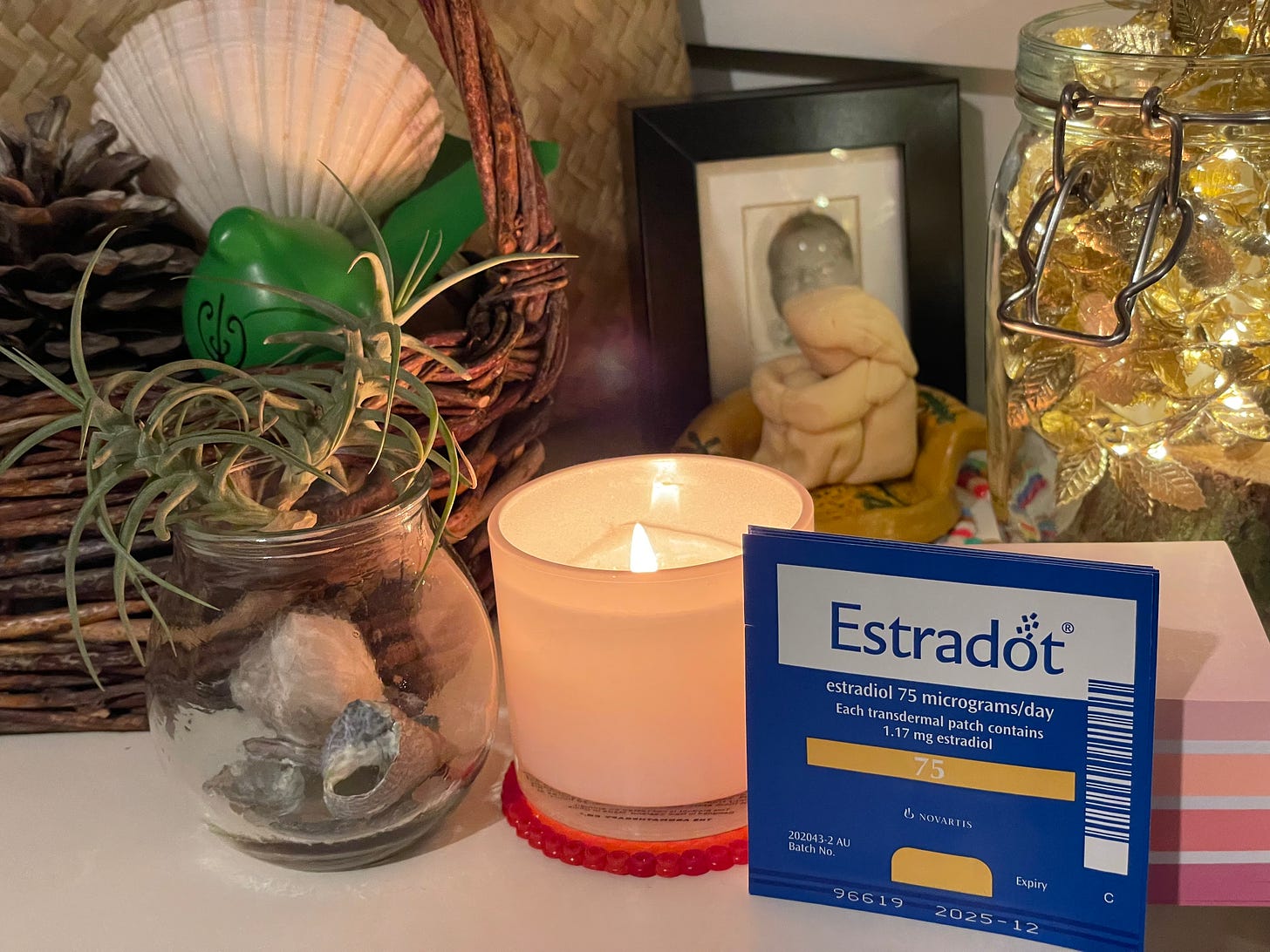Global Shortage of Estradiol Patches May Put Perimenopausal Autistic People at Risk
What we need: certainty, suicide prevention, community and autistic-friendly communication with health practitioners
PSA: If you are feeling suicidal, please immediately recognise your need to tell someone who can help you, then seek their help.
It is finally making national news here: there is a global supply shortage of my life-preserving estradiol (a form of oestrogen; I will use both terms to mean the same in this essay) patches. The predicted shortage has hit Aotearoa New Zealand hard. Suppliers, Pharmac, pharmacists, doctors and patients all knew this was coming, and somehow it still wasn’t prevented.
“Nothing about us without us” is an often used phrase within the autistic community, highlighting our internal drive to lead the way in supporting our neuro-affirming lifestyles.
As usual though, due to medical misogyny causing a lack of expert knowledge in autistic menopause, many of us have inadequate supports in place to mitigate the physical and psychological risks that may come from suddenly stopping our treatment.
Academic research into the effects of the autistic menopausal transition is still its infancy and there is dangerously low public awareness.
Estrogen patches are life-preserving for many
Estradiol patches do not restore me back to my pre-peri levels of energy. But they are incredibly effective at stopping me from feeling like I would rather be dead, because pharmaceutical prescribed hormones are the best treatment for hormonal depression.
Even on my high dose of estradiol via patches and pills, motivating myself to get started on anything as I endure my latest autistic perimenopausal regression in my functioning is painful.
Inertia is my default.
This morning I curled up in the foetal position in my family’s sensory lycra hammock, enveloped in a soft blanket, suspended deliciously above the floor, whilst listening to a yoga meditation nidra track. The lycra pressed against my form with firm even pressure, giving the proprioceptive feedback my depleted brain and body need to relieve stress and anxiety.
In choosing to do nothing, I had chosen to do something. Something for myself. To rest and self-regulate. I had chosen to lean into my temporary regression, because recent attempts to fight it have led to hours upon hours of doom scrolling, inertia and shutdowns.
Upon waking from my nidra-turned-nap in the hammock, I consciously opted to doom scroll check my social newsfeeds and national news websites.
Yes, New Zealand is geographically remote and isolated. Kiwis have a can-do attitude that promotes toughing life out, and rewards self-sufficiency. As an outsider, I consider this a detrimental philosophy in many respects. Their optimism riles me up, being the exceptional pessimist and catastrophiser that I am.
“She’ll be right” is a Kiwi phrase that I hear all too often, and it irks me every time. (Translation: just get on with it, there’s nothing wrong with you, it is what it is.)
What little remaining energy I do have, once my family duties are done, I use to advocate and raise awareness on autistic perimenopause.
Autism gifts me a liberating disregard for social hierarchy, and my lagging neurodevelopmental issues ensure I do not feel intimidated easily. DSM-5 considers those disordered traits, but I do not see it that way. I sit alongside my children in their therapy appointments, and while they play I email research academics, draft essays and lobby for the collective rights and needs of New Zealand’s disabled and neurodivergent population.
It is exhausting.
With my estradiol patches, I have barely enough energy to get the bare minimum of chores done. Without them, I risk the return of suicidal thoughts and worse.
With this global supply shortage I feel like I am drowning, like we are all drowning and everyone else (The Patriarchy, anyone?) is watching it happen. And I haven’t even run out of my personal stash just yet.
Exhaustion is not unique to me, I am neither special nor unusual. I am a parent carer in autistic burnout, carer burnout and in perimenopausal burnout. A temporary regression is to be expected, surely?
Those not requiring such specialist hormonal treatment (The Patriarchy returneth) tell us we need to just get on with it like everyone else. Can they not see we are using up our finite energy just to survive? Let’s remember here how exquisitely late diagnosed autistic women mask our differences’ until the mask cracks and falls away in perimenopause.
Autistic perimenopausal people need ongoing hormone replacement therapy (HRT), if that is their treatment of choice. We need to know that our estradiol patches are in abundant, or at least sufficient, supply. That we will still have this essential treatment to buffer our oestrogen levels. To ride the natural yet extreme fluctuating hormone levels in perimenopause, that cause our extreme fluctuating moods, capacity and ongoing psychological safety.
Autistic midlife women are three times more likely to die from suicide than non-autistics.
HRT is a life-preserving treatment to many autistic perimenopausal people, yet as a group we:
are less likely to have the knowledge that we are in perimenopause
have little to no support network in this time of life
experience communication challenges with being seen, heard and validated by health professionals (Brady et al., 2024).
This makes it harder for many autistics to get the treatment they need.
If this affects you too, then I am so sorry and I completely empathise.
I wish I could offer reassurance and practical solutions here, but if the pharmaceutical suppliers and everyone else who gets paid to hasn’t figured this all out, I have no chance.
What I can offer you is the validation that it is okay to feel however you are feeling. We are in a dire situation that should never have been allowed to happen. It is wide scale medical misogyny.
If you are feeling suicidal, please immediately recognise your need to tell someone who can help you and seek help.
If you are feeling angry, isolated, sad, frustrated or anything else, you are welcome to reach out to me publicly in the comments, or send me a private message.
We need community to get through this, so let’s all support each other in whatever way we can 💕





(Trundles off to put in a repeat prescription). I get you. Have the gel rather than the patches and it was life transformative. It took over 2 years to get and eventually some serious begging. But I was ready at that point to end it all. It’s ridiculous how hard it was to get, and yet men just walk into the pharmacy and buy their little blue pills with a brief chat with the pharmacist and it’s all good. It beggars belief. I have ME/CFS and I often wonder if my constant decline since my early 40s is due to menopause and autism mixed.
I hope your supply line re establishes integrity soon.
I'm so sorry you're going through this. Your courage and dedication to advocating for autistic perimenopausal people is truly inspiring. It's heartbreaking to see the struggles you face due to the shortage of estradiol patches. Please know that your voice is powerful, and your efforts to raise awareness and support others are deeply appreciated.